| Srl | Item |
| 1 |
ID:
128133


|
|
|
|
|
| Publication |
2013.
|
| Summary/Abstract |
On June 18 as Afghan president Hamid Karzai and the high peace council prepared to start talks independently with the Taliban in Doha, Emirate of Qatar, the United States after playing hide and seek and holding undisclosed intermittent talks in Doha for more than a year announced that it will be opening direct talks with Taliban leaders within days. At the time of writing, these talks have not begun, but a US delegation has arrived in Doha and they expect to begin talking soon
|
|
|
|
|
|
|
|
|
|
|
|
|
|
|
|
| 2 |
ID:
124204
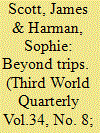

|
|
|
|
|
| Publication |
2013.
|
| Summary/Abstract |
The current round of World Trade Organization (WTO) negotiations-the Doha Round-has significant implications for global health which have received insufficient attention from the global health community. All too often the health implications of global trade agreements are examined only after their conclusion, and are concerned only with intellectual property rights. This paper seeks to move beyond this narrow focus and elucidate the wider health implications of the Doha Round. It explores the negative effect of the Round on state capacity to provide and regulate health services in low-income countries, and the impact it will have on livelihoods among the poor and their ability to access health services. Overall the paper makes the case for greater engagement from the health community with the wto and the Doha Round negotiations beyond the customary focus on intellectual property rights.
|
|
|
|
|
|
|
|
|
|
|
|
|
|
|
|
| 3 |
ID:
083720
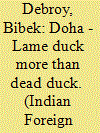

|
|
|
| 4 |
ID:
103837
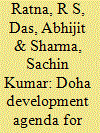

|
|
|
|
|
| Publication |
New Delhi, Centre for WTO studies, 2011.
|
| Description |
43p.
|
| Series |
Discussion paper no. 8
|
|
|
|
|
|
|
|
|
|
|
|
Copies: C:1/I:0,R:0,Q:0
Circulation
| Accession# | Call# | Current Location | Status | Policy | Location |
| 055895 | 382.92/RAT 055895 | Main | On Shelf | General | |
|
|
|
|
| 5 |
ID:
022071
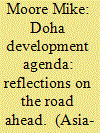

|
|
|
|
|
| Publication |
May 2002.
|
| Description |
1-9
|
|
|
|
|
|
|
|
|
|
|
|
|
|
|
|
| 6 |
ID:
130916
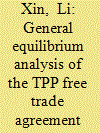

|
|
|
|
|
| Publication |
2014.
|
| Summary/Abstract |
The approaching tenth year of the Doha Round with no achievements to celebrate indicates a failure of the World Trade Organization. Formal negotiations of the Round expired in 2005 without reaching a consensus, and informal negotiations were stalled in 2008. Thus, the Trans-Pacific Partnership (TPP), a recent initiative to deepen trade relations among countries bordering the Pacific, was greeted with applause and relief as a step in the right direction. This article discusses the region-wide Free Trade Agreement series of linked agreements that cover various members and issues. The recursive dynamic computable general equilibrium (CGE) model simulates two scenarios against the baseline, namely, a TPP agreement with China and without China. The preliminary results show that the TPP agreement without China cannot change the significant roles of markets and geography as the principal factors behind the economic integration of Southeast Asia with China. Trade and investment agreements facilitate market forces, they do not oppose them. The integration of the Asia-Pacific countries may benefit the US and other key economies.
|
|
|
|
|
|
|
|
|
|
|
|
|
|
|
|
| 7 |
ID:
021903
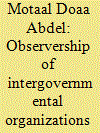

|
|
|
|
|
| Publication |
May 2002.
|
| Description |
477-489
|
|
|
|
|
|
|
|
|
|
|
|
|
|
|
|
| 8 |
ID:
132464
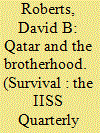

|
|
|
|
|
| Publication |
2014.
|
| Summary/Abstract |
In June this year, an Egyptian court's decision to sentence three Al-Jazeera journalists to lengthy prison terms marked a new low in deteriorating Qatar-Egypt relations, but was only one among many international-relations difficulties that the small Gulf state has faced in recent years. The tenure of Emir Tamim bin Hamad Al Thani, who ascended to the throne in summer 2013, has been something of an annus horribilis for Qatar, even in terms of the country's relations with its fellow Gulf Cooperation Council (GCC) states, with which it has much in common. Against a backdrop of sporadic intra-regional problems, the latest iteration of these difficulties crystallised in early March, when Saudi Arabia, the UAE and Bahrain took the unprecedented step of withdrawing their ambassadors from Qatar en masse.
|
|
|
|
|
|
|
|
|
|
|
|
|
|
|
|
| 9 |
ID:
132042
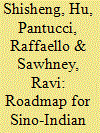

|
|
|
|
|
| Publication |
2014.
|
| Summary/Abstract |
A NATO and Western powers begin to take a backseat in Afghanistan 's future, one of the most pressing questions is what role the region can play in helping Afghanistan to become a prosperous and stable nation. Numerous efforts are already underway through multilateral and bilateral forums, yet the key to regional cooperation for Afghanistan' s future lies through closer interaction between Beijing and New Delhi. Drawing on a research project spanning a number of workshops in Beijing, New Delhi and Qatar and involving influential thinkers and experts from China, India, the UK and Afghanistan, this paper will try to map out specific ideas that policymakers in Beijing and New Delhi can explore as avenues of cooperation. Post-2014 Afghanistan will remain a major regional concern for at least the short to medium term. The earlier China and India can develop workable collaborative undertakings, the sooner they can forge a stable and prosperous neighbourhood.
|
|
|
|
|
|
|
|
|
|
|
|
|
|
|
|